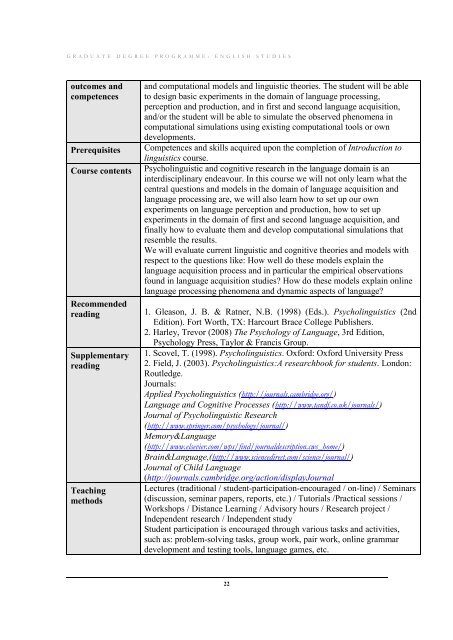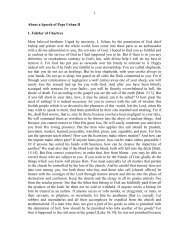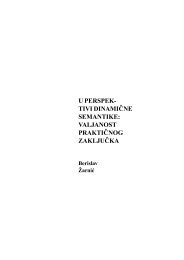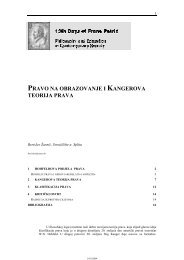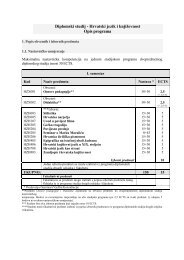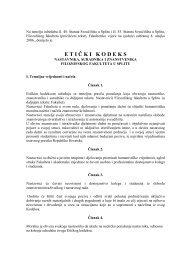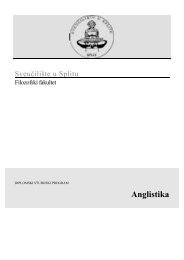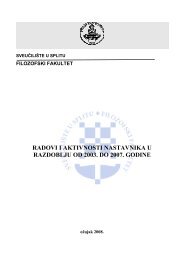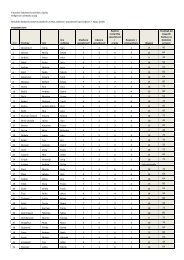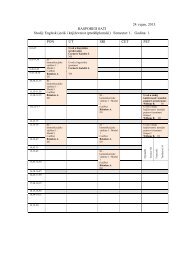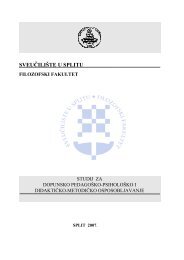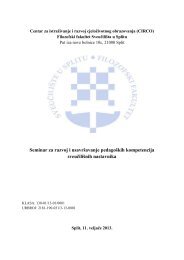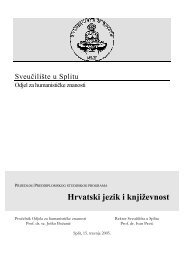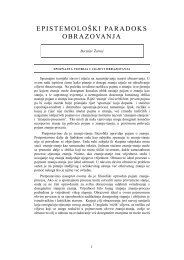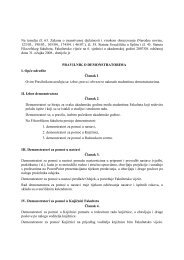English Studies
English Studies
English Studies
Create successful ePaper yourself
Turn your PDF publications into a flip-book with our unique Google optimized e-Paper software.
G R A D U A T E D E G R E E P R O G R A M M E : E N G L I S H S T U D I E S<br />
outcomes and<br />
competences<br />
and computational models and linguistic theories. The student will be able<br />
to design basic experiments in the domain of language processing,<br />
perception and production, and in first and second language acquisition,<br />
and/or the student will be able to simulate the observed phenomena in<br />
computational simulations using existing computational tools or own<br />
developments.<br />
Prerequisites Competences and skills acquired upon the completion of Introduction to<br />
linguistics course.<br />
Course contents Psycholinguistic and cognitive research in the language domain is an<br />
interdisciplinary endeavour. In this course we will not only learn what the<br />
central questions and models in the domain of language acquisition and<br />
language processing are, we will also learn how to set up our own<br />
experiments on language perception and production, how to set up<br />
experiments in the domain of first and second language acquisition, and<br />
finally how to evaluate them and develop computational simulations that<br />
resemble the results.<br />
We will evaluate current linguistic and cognitive theories and models with<br />
respect to the questions like: How well do these models explain the<br />
language acquisition process and in particular the empirical observations<br />
found in language acquisition studies? How do these models explain online<br />
language processing phenomena and dynamic aspects of language?<br />
Recommended<br />
reading<br />
Supplementary<br />
reading<br />
Teaching<br />
methods<br />
1. Gleason, J. B. & Ratner, N.B. (1998) (Eds.). Psycholinguistics (2nd<br />
Edition). Fort Worth, TX: Harcourt Brace College Publishers.<br />
2. Harley, Trevor (2008) The Psychology of Language, 3rd Edition,<br />
Psychology Press, Taylor & Francis Group.<br />
1. Scovel, T. (1998). Psycholinguistics. Oxford: Oxford University Press<br />
2. Field, J. (2003). Psycholinguistics:A researchbook for students. London:<br />
Routledge.<br />
Journals:<br />
Applied Psycholinguistics (http://journals.cambridge.org/)<br />
Language and Cognitive Processes (http://www.tandf.co.uk/journals/)<br />
Journal of Psycholinguistic Research<br />
(http://www.springer.com/psychology/journal/)<br />
Memory&Language<br />
(http://www.elsevier.com/wps/find/journaldescription.cws_home/)<br />
Brain&Language,(http://www.sciencedirect.com/science/journal/)<br />
Journal of Child Language<br />
(http://journals.cambridge.org/action/displayJournal<br />
Lectures (traditional / student-participation-encouraged / on-line) / Seminars<br />
(discussion, seminar papers, reports, etc.) / Tutorials /Practical sessions /<br />
Workshops / Distance Learning / Advisory hours / Research project /<br />
Independent research / Independent study<br />
Student participation is encouraged through various tasks and activities,<br />
such as: problem-solving tasks, group work, pair work, online grammar<br />
development and testing tools, language games, etc.<br />
22


